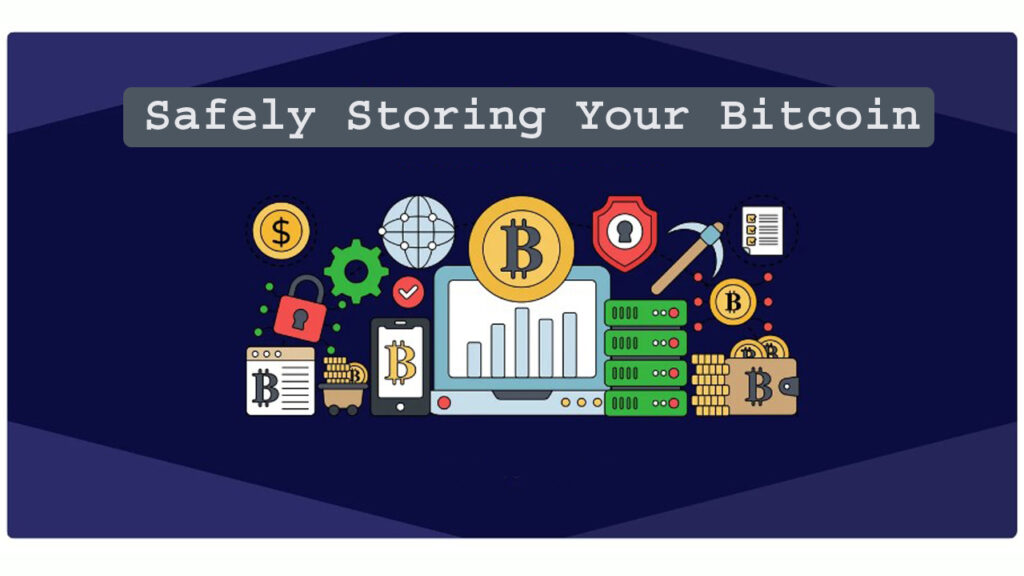Bitcoin and other cryptocurrencies change the concept of money as it provides users with a new form of digital currency. However, they also have the angle of managing your own money on the line as well as making investments. Cryptocurrencies are usually not refundable or recoverable once they are lost or stolen.
There are steps that one can take to reduce the likelihood of such an occurrence, and therefore, store your bitcoin safely.
Securing Your Bitcoin Wallets
Bitcoin wallets can be referred to as a virtual place where the information about bitcoin transactions and their owners is kept, as well as the unique digital code that allows accessing the bitcoin is stored.
Wallets are the most essential factor when considering the safety of your bitcoins, and so securing the wallets is the initial step towards protecting your investments.
Use Hardware Wallets for Large Holdings
For significant bitcoin holdings:
- You should use a hardware wallet, the Ledger, Trezor, or similar devices for storing your Bitcoin.
- Hardware wallets also store private keys in an environment that is physically detached from a connected device.
- Protect your equipments even if the computer that you are carrying is infected by a virus.
Mobile and Desktop Wallets for Smaller Amounts
For small amounts, or more active use:For small amounts, or more active use:
- Mobile wallets such as Coinbase Wallet are quite helpful and adequately protected.
- Desktop wallets like Exodus are relatively secure with additional features offered in contrast to the mobile ones.
Paper Wallets for Long Term Cold Storage
For very long term holdings:For very long term holdings:
- In this type, the bitcoin private keys are printed and stored on pieces of paper known as paper wallets.
- Paper wallets can be quite secure when created using a proper algorithm on a separate offline computer
- Paper wallets should also be stored away from general viewing – theft
Regardless of which type of wallet you own, always adhere to the best security practices: your passwords must be strong and unique, and if the service provides two-factor authentication, do not hesitate to activate it.
Bitcoin Private Key Protection
Your Bitcoin private key must also be protected. Bitcoin is yet another online currency and if it falls into the wrong hands such as hackers or malware, they can steal it.
Avoid Online and Computer Threats
- These private keys should be generated offline so that no internet connection is available at the time of generation.
- Or, use hardware wallets that are solid and reliable, the private keys to which are stored offline.
- Privately shared information in computers can be pirated by malware when it is not protected by a key.
Safe Backup Locations
Make a backup copy of your wallet so that you can recover it if devices with your wallet are lost or no longer working.
Potential backup locations:
- External drives that are stored off-site on physical shelves
- The password manager note section – for mobile or hardware wallets
- Safe deposit boxes – In case there exists physical copies such as paper wallets, then these should also be backed up.
Multisignature Arrangements
For extra security:
- Security: adopt to multisignature wallets which need more than one private key to access the bitcoin.
- Typically 2-out-of-3: mplies that to reach at least two of the keys, the attacker would require at least one of the other three.
This preserves data from being stolen, a piece of hardware failing, or the key to access it being lost.
Personal Operational Security Measures
Beyond directly securing bitcoin private keys, good personal InfoSec habits also help protect your cryptocurrency assets:
Strong Unique Passwords
- Employ random long strings of characters for passwords, and if possible, at least twelve characters long.
- Do not use the same password for your different accounts or services.
- One way to help manage passwords is to think about using a password manager for the creation and storage of strong passwords.
Two Factor Authentication
- Where possible, the organization should use two-factor authentication such as the application or physical keys.
- Entails another factor of authentication needed apart from a password
- It prevents many password phishing attacks from happening in the first place.
Beware Social Engineering
- Note new, highly professional attempts to get the private keys or account access.
- Some of the methods used are fake exchange/wallet apps, fake links, fake identities, threats, or fake support personnels
- In any case, it might be wiser to call them directly using official support contacts.
With basic details of account security, avoidance of malware, phishing and social engineering are some of the best practices that can be put in practice to minimize the chances of an attack on your bitcoins.
Additional OpSec and Backup Precautions
Some final precautions to take:Some final precautions to take:
Avoid Bitcoin Related Apps on Main Devices
- One may have to consider investing more in dedicated hardware that will only be used for bitcoin storage and its use.
- Do not download any file or app that may contain malware that could affect bitcoins on phones and computers.
Air Gapped Cold Storage
For very large holdings:
- Any type of computer that is not connected to a network or the internet should be used.
- Absolves private keys totally from any form of online dangers
Geographic Redundancy
- Some experts recommend storing bitcoin backups at different physical locations in order to avoid the possibility of theft or confiscation.
- Reduces the risk that an organization can experience a catastrophic loss, for example through floods, fires, or other disasters affecting a specific area.
Through the use of a number of security techniques such as the use of hardware, software, operations and geography, it is possible to come up with an acceptable security for the bitcoins whose value and importance can be ascertained.
Conclusion
That means storing cryptocurrencies is much more complex in terms of security as compared to traditional assets. By adhering to the best practices in the use of the wallet technology, generation of the private key, backup of the data, isolation from potential threats and other general principles of info security you can safely store your bitcoins and effectively reduce any risks. This means that one must consider the amount of bitcoins that he or she holds while selecting the security measures to adopt but at the same time, there is need to ensure that the measures adopted for security are not difficult to use.

